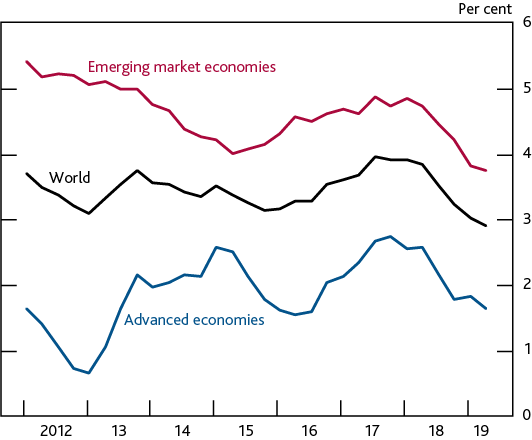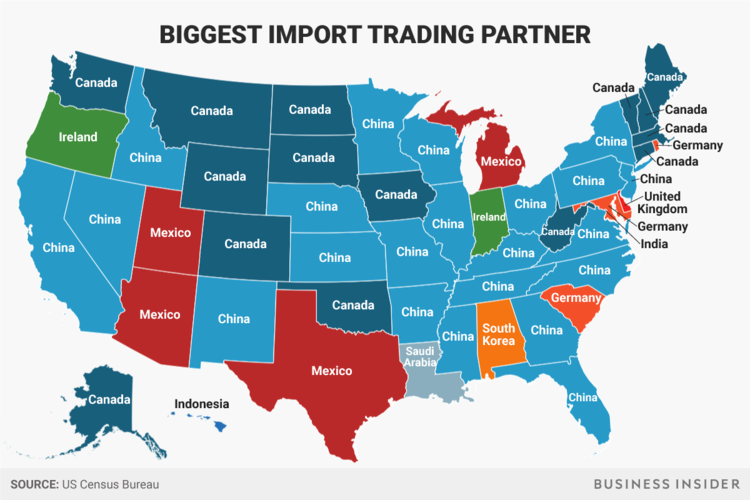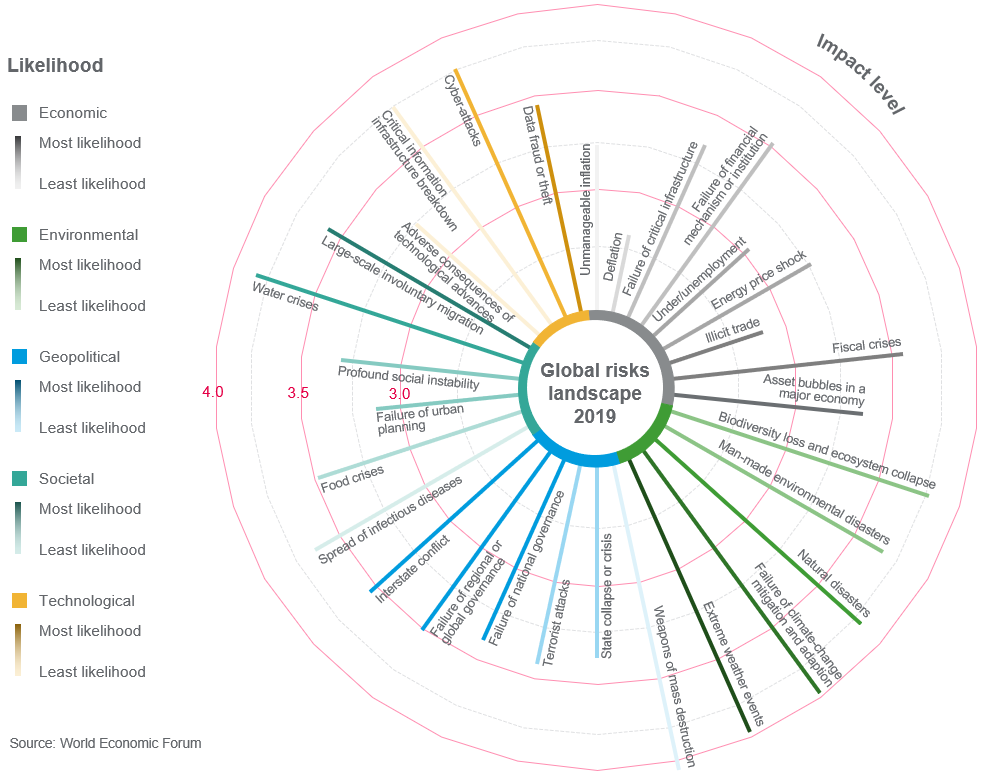As we enter into the ‘Roaring Twenties’, there is much change and uncertainty afoot and advanced and emerging market economies alike are still tracking their downward trajectories. Meanwhile, trade tensions continue between advanced economies with the ever-present threat of tariffs and restrictions, consumer demand is faltering in many areas and central banks have little ammunition in their armouries to stimulate their own economic recoveries. And through all this, the unrelenting march of technology continues.
Fig1: Global economic growth slowing

Source: Eikon from Refinitiv, IMG World Economic Outlook and Bank of England calculations
Of course, ‘uncertainty’ is something all business leaders face, but how that uncertainty is considered and acted upon is what differentiates successful business leaders from the pack.
Since the end of the Second World War and particularly over the last 40 years, the world has ‘shrunk’ rapidly with better transport links between major economic hubs, enhanced communication systems, and all backed by the stratospheric change brought about through technology. The result has been ‘globalisation’ - the search for better supplier deals and producers ever further from the end consumer. This is evident across all the major advanced economies but nowhere better exemplified than the United States
The corporate search for new markets to open into and, of course, the demand of shareholders for greater, safer returns on their investments is leading businesses to seek more efficient, and cheaper, ways of doing things.
Fig 2: Biggest import trading partner locations in every US State across 2018

But are things about to change as we enter the 2020s?
The weakness of many global supply chains and corporates, in relation to global issues is evident.
Let’s just consider the vast Chinese market and the fine threads exposed recently by the Coronavirus situation. With the Chinese population experiencing movement restrictions, this is having a knock-on effect on Chinese output and factory production targets is just one example. The upstream supply chain shocks to customers elsewhere in the globe will do only one thing in the short term, increase. So, we are seeing supply chain shocks and shortages, as well as demand-side dampening on orders as businesses and consumers re-evaluate their ordering and balance sheet strengths. Coordinated central bank activity is underway to stimulate and counter the wider economic shock caused by the virus and fiscal stimulus packages are likely to be seen during 2020 in addition.
How many business risk registers had previously seriously considered the impact of a virus on their business performance and global economic outlook? The answer is likely to be not many.
Another issue we face is the climate emergency and the changes and choices we will all have to make in the years ahead. The business that is not aligned to the demands of their clients and consumers may well be left behind by people looking for an alternative that is better suited to the expectations of their consumers, suppliers and workforce. The impact of severe weather events on business is expected to increase in frequency in the 2020s. How adaptable is your operation to this? What are your alternative ways of operating? What impact will state imposed regulations and taxes, in order to comply with net carbon-neutral targets, have on the way businesses operate?
World health issues and climate change are just two examples of how our ever more globally dependant and changing world impacts us all. The World Economic Forum’s Global Risks report, produced every year, is a sober read. I would task every executive to read this report and consider the impact to your business in detail. At least then if no action is taken, it is an informed business decision.
The challenges are real, clear and present.
Fig 3: Global risks, likelihood and impact summary

Expansion into new markets and territories is not going to stop of course, and nor should it. However, it seems that global trade is entering a new era - the second since the end of the Second World War -where globalisation is reimagined. Instead of travelling a path towards deglobalisation, we are entering into a period of ‘reglobalisation’, where existing structures are reconsidered - from the way products are packaged, to how they reach their markets.
This task must be taken seriously by business leaders to be truly effective. As ever, if senior leaders are not fully behind a project of such importance, then it is doomed to fail. Creating a dedicated project team assessing impacts, risks, and arising opportunities, is beneficial to any organisation. Such a team would undertake research into the economic and business impacts of changing the way the organisation operates in order to be efficient and ready for the future. Just like all important projects, this requires investment, both in money and time.
The time for action is nigh in order to be ready for the world’s expectations beyond this current decade. For the successful business leader of today, there simply is no time to be average. Instead, it is time to be bold and reimagine what is possible in a re-globalised world.







